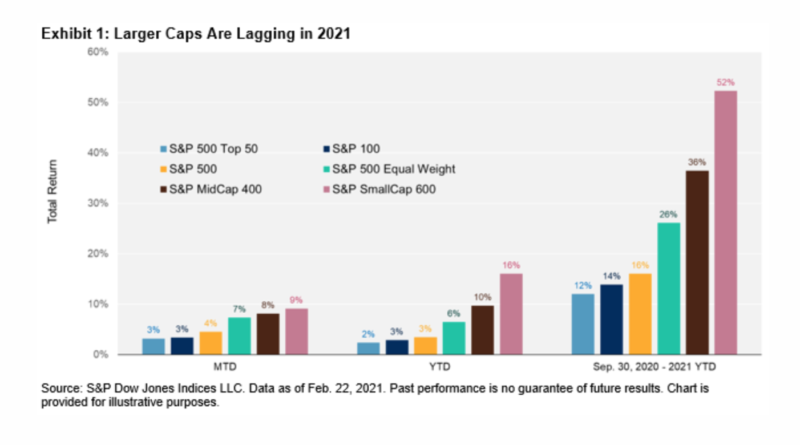
By CRAIG LAZZARA
For at least five years, we’ve noticed that, despite historical performance, active managers regularly proclaim that this year will at last be the time when active management shows its value. I suspect that most advocates of indexing derive at least some guilty pleasure from observing this ritual. (I know I do.)
So, we want to ask, if you know that active management will outperform this year, did you also know that passive would outperform last year? If you knew, why didn’t you say so? And if you didn’t know then, why should we believe that you know now?
All of which implies that when we see some evidence that 2021 might be a relatively favorable environment for active managers, we should say so. Here are three hopeful signs for active managers.
- Last year’s returns were dominated by the exceptional performance of very large-cap stocks. As readers of our daily dashboard will recognize from Exhibit 1, 2021 so far looks to be a different story. Year-to-date through Feb. 22, 2021, the S&P 500® is up 3.43%, lagging the performance of the S&P MidCap 400® (up 9.71%) and S&P SmallCap 600® (up 16.00%). The S&P 500 Equal Weight has risen 6.45% over the same period, indicating that the average stock in the S&P 500 is beating the cap-weighted average. All of these indicators are historically suggestive of a relatively benign environment for large-cap active managers, most of whose portfolios tilt toward smaller names.

- Dispersion has been running at above-average levels (dramatically so in the case of small caps). If a manager has genuine stock selection skill, high dispersion will reward it (just as it will penalise its counterfeit).
- Correlation among stocks, although not far off average levels currently, has run well above average for the past year. High correlations provide a paradoxical benefit to active managers. Correlations can be confusing, because we all learn in basic finance that low correlations are good. For a given set of assets and weights, lower correlation will mean less volatility. But assets and weights are not given when we compare active and passive management; the essence of active management is to choose a different set of assets and weights from those of a passive benchmark. Doing so typically produces a portfolio with more volatility than its benchmark. How much more? It depends on correlations. If correlations are relatively low, an active portfolio will bear much more volatility than its benchmark. If correlations are relatively high, the active manager forgoes a smaller diversification benefit.
Active returns in 2021 might therefore benefit from the improved relative performance of smaller names and the generally higher level of dispersion, without bearing dramatically higher levels of incremental volatility. If these trends continue, then 2021 might at last be the year when active management reaches its sunlit uplands.
CRAIG LAZZARA is Managing Director and Global Head of Index Investment Strategy at S&P Dow Jones Indices.
This article was first published on the Indexology blog.
MORE FROM S&PDJI
For more valuable insights from our friends at S&P Dow Jones Indices, you might like to read these other recent articles:
What does GameStop mean for market efficiency?
Is equal weighting worth considering?
Beware spectacular success stories
2020 and the danger of extrapolation
Three reasons why the index advantage will persist
PREVIOUSLY ON TEBI
The odds of outperforming through active management
Which is best for corporate bonds — active or passive?
Do financial marketplaces provide enough protection?
Who should carry the can for the Woodford blow-up?
The implications for investors of shrinking markets
Picture: Elena Koycheva via Unsplash
© The Evidence-Based Investor MMXXI









